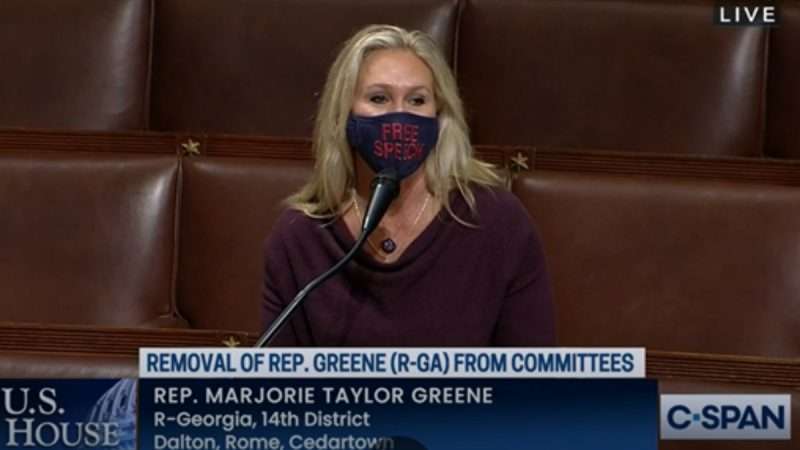[This post was co-authored by Josh Blackman and Seth Barrett Tillman]
On Tuesday, February 2, 2020, the House of Representatives’ Managers filed an 80-page trial memorandum or brief for the impending Senate impeachment trial. The Managers discussion of the First Amendment spans about three pages (pp. 45-48). And the brief cites several posts from Volokh Conspiracy co-bloggers Jonathan Adler, Ilya Somin, and Keith Whittington. These posts responded to our prior Volokh Conspiracy posts. We have five general responses to the position put forward in the trial memorandum.
First, the trial memorandum states that “the First Amendment does not apply at all to an impeachment proceeding.” We think it a mistake to view impeachment proceedings in this binary fashion: that the First Amendment does, or does not apply to an impeachment proceeding. The phrase “high Crimes and Misdemeanors” in the Impeachment Clause (1788) does not definitively resolve how other provisions of the Constitution—including the not-yet ratified First Amendment (1791)—would apply to impeachment proceedings. Moreover, in our February 3 post, we wrote:
The original meaning of the phrase “high Crimes and Misdemeanors” in the Constitution is of uncertain scope. And the materials we have from the Philadelphia Convention, the state conventions, and the public ratification debates do not provide clear answers to the precise question we face today. Likewise, past impeachments provide inconclusive, and at times, conflicting precedents.
As a result, each member of Congress, who takes an oath to the Constitution, acting in good faith, may decide whether, and how the First Amendment should apply in impeachment proceedings. Accordingly, we think it a mistake to make an unqualified statement that “the First Amendment does not apply at all to an impeachment proceeding.” (emphasis added).
Our position that the First Amendment applies in an impeachment proceeding is not novel. In 1868, during the Johnson impeachment, several Senators contended that an article of impeachment ran afoul of the First Amendment. In our January 17 post, we explained the relevance of these statements:
We do not here, nor did we in our prior post, cite these senators as holding the only view about the scope of the President’s free speech rights in the impeachment context. We acknowledged that some senators who voted to convict, as well as the prosecuting House managers, rejected this free speech argument. Our goal was not to say, and we did not say, that the Johnson trial established the correct position. Rather, we raised this history to show that the issue was, and remains, fairly contestable. In 1868, there was a difference of opinion about what speech rights the President has. That same debate exists today. This issue is not clear. It is not settled. There is no controlling on-point judicial precedent. There is some on-point discussion from a prior presidential impeachment. And those debates from the Johnson Senate trial provide some support for our position. But we do not think this issue has been resolved or liquidated.
We take it as a starting point that some Senators can decide in good faith, based on their Constitutional oath, that the President can raise the First Amendment as a defense in the Senate trial. The question then becomes, what theory of the First Amendment is available to the President.
The fact that the House spends several pages discussing Supreme Court caselaw suggests that the Managers are not willing to rest on the absolute position that the First Amendment is inapplicable. This argument, we think, represents a tacit recognition that Senators, in good faith, could find that the President may raise a First Amendment defense.
Second, in the alternative, the House trial memorandum argues that the First Amendment ought to apply differently to the President. Specifically, in a footnote, the House argues that the President stands in the same position as a civil servant:
Indeed, impeachment is fundamentally an employment action against a public official, and thus the First Amendment would not insulate the President’s statements from discipline even if it applied, because the government’s interest in orderly operation would outweigh the President’s speech interests. See Garcetti v. Ceballos, 547 U.S. 410 (2006); Connick v. Meyers, 461 U.S. 138 (1983); Pickering v. Board of Education, 391 U.S. 563 (1968).
We think the Managers erred in analogizing Congress’ power to remove an elected President to an employment action involving civil servants. Many courts have held that First Amendment challenges by elected officials are not governed by Pickering. We say many courts. Not all courts—as with so many issues, authority is divided. Scholarly articles have also touched on this question. For example, Professor Katherine Shaw opined on this issue in her Impeachable Speech. In that article, she stated:
Outside of the impeachment context, there are of course First Amendment cases that grapple with government officials as speakers. The Pickering/Garcetti line of cases attends to the speech rights of government employees, creating a standard that is understood to grant public employees very limited First Amendment rights when they speak pursuant to their official duties. But it is not clear whether or how the reasoning in these cases would have any application to the unique figure of the president, who is clearly not a government “employee” in the same sense as the officials at issue in the [Supreme] Court’s cases, and where the “sanction” of impeachment is surely distinct from other sorts of professional consequences public employees might face over the content of their speech.
Other precedent could support the argument that a president’s speech is in some sense protected from sanction by the First Amendment. Perhaps most relevant here is Bond v. Floyd, in which the Supreme Court held that the First Amendment prevented the Georgia legislature from refusing to seat Julian Bond, based on speeches he had made criticizing the Vietnam War and the federal government generally. A president might invoke this case to support the argument that a Congress pursuing impeachment based in part on speech is engaging in a form of impermissible viewpoint discrimination.
Similarly, we wrote in our January 17 post:
Pickering and Garcetti were cases about civil servants. These precedents do not furnish good analogies to justify removing elected officials [such as the President] for purported speech-related wrongs.
We think Professor Shaw’s position has merit. Professor Shaw also cites the Supreme Court’s First-Amendment-friendly Brandenburg test, and suggests it is relevant to evaluating the constitutionality or lawfulness of impeachments involving speech-related allegations of wrongdoing.
Third, the House Manager’s trial memorandum seems to recognize that the President does not stand in the same position as a civil servant. The trial memorandum instead analogizes the President to senior appointed officers:
As the leader of the Nation, the President occupies a position of unique power. And the Supreme Court has made clear that the First Amendment does not shield public officials who occupy sensitive policymaking positions from adverse actions when their speech undermines important government interests.
We agree that “public officials who occupy sensitive policymaking positions” stand in a different position than civil servants. And we agree that certain senior appointed federal officers who make policy have reduced Free Speech rights, even below the Pickering standard. We previously wrote that when senior appointed federal officers “speak, their message is more readily mis-identified as that of the President they serve.” As a result, the appointing authority “needs more control over them.”
The trial memorandum, at footnote 203, cited two cases that reflect this dynamic. In Branti v. Finkel (1980), the Rockland County Public Defender—a Democrat—who was appointed by the County Legislature, planned or intended to discharge two assistant public defenders because they were Republicans. Aaron Finkel and Alan Tabakman had worked for the office for several years, and served at the “pleasure” of the County Public Defender. Ultimately, the Supreme Court ruled for Finkel and Tabakman based on the First Amendment. But the Court’s decision did not rely on Pickering. These at-will public defenders were not analogous to civil servants. Likewise, Elrod v. Burns (1976) involved “non-civil-service employees” who were “not covered by any statute, ordinance, or regulation protecting them from arbitrary discharge.” Here too, the Supreme Court did not rely on Pickering.
Yet, neither of these cases concerns the status of an elected official. We do not think the President can be analogized to civil servants. And we do not think the President can be analogized to senior appointed federal officers with policy-making responsibilities.
In our prior post, we explained why the analogy in the Manager’s trial memorandum does not hold:
By contrast, the President is not a cabinet member, who works for a superior—other than the People who act through elections. Nor is the President a GS-15 who can be disciplined for speaking at a political rally. Treating the President as an appointed officer or a civil servant would eliminate the President’s ability to act like a politician and party leader. With good reason, the elected President is not subject to the Hatch Act. He is expected to engage in overtly partisan speech. In our view, the President has more expansive free speech rights than civil servants, who have broader free speech rights than at-will executive-branch officers. There is a hierarchy for speech rights for these different positions. It is not the case that principal officers have more rights than inferior officers who have more rights than civil servants. Government officials and officers are not an undifferentiated mass, with identical First Amendment rights. Nor do these rights track the traditional status of positions in the government. Instead, we suggest that elected officials have the widest scope of free speech rights, civil servants enjoy some free speech rights which are subject to certain limitations, and that at-will presidential appointees enjoy the least.
Fourth, the trial memorandum asserts that the House and Senate stand as the superior over the President, in the same fashion that the President stands as the superior over a cabinet member.
Thus, just as a President may legitimately demand the resignation of a Cabinet Secretary who publicly disagrees with him on a matter of policy (which President Trump did repeatedly), the public’s elected representatives may disqualify the President from federal office when they recognize that his public statements constitute a violation of his oath of office and a high crime against the constitutional order.
Indeed, in a footnote discussed earlier, the House trial memorandum describes “impeachment [as] fundamentally an employment action against a public official.” These statements reaffirm the House’s position that Congress is the President’s superior. Here, we reach a central point: what is the precise role that Congress plays with respect to impeachment? Is Congress, by virtue of being elected, the superior over the President? We submit the answer is no. It is true that the President draws a salary, as do appointed officers and civil servants. But as a general matter, the President is not considered as an employee, either at-will or subject to some sort of civil service protection. A member of Congress draws salary and can be “removed” by a super-majority of her house. But that does not make a member of Congress an “employee” in the sense that term is commonly used. Professor Shaw, quoted above, expressly rejects analogizing the President to an “employee”—the position asserted in the Manager’s trial memorandum.
Moreover, we previously wrote:
We reject this analogy between the President and civil servants. Congress is not the superior to the inferior President. They are both elected. They both make policy, within the confines of complying with the legal system. They are both authorized in different ways to control the government-as-employer. As a general matter, Congress does not stand in the role of the employer vis-a-vis the President. If the President has an employer, it is the People, not Congress through impeachment. And that role exists throughout the entirety of a President’s four-year term, and not only during the short election season.
Between elections, Congress does not serve as a stand-in for the People. The impeachment process is not akin to a vote of no-confidence, a common procedure in parliamentary governments. The President will stand for election in four years, and the people can decide whether he warrants re-election. Rather, the Constitution empowers Congress to remove the President if specific legal standards are satisfied. The President is not an at-will employee.
Fifth, the Manager’s trial court brief considers a final argument in the alternative: even if Brandenburg is the relevant standard, the President’s speech is still not protected:
Yet even if President Trump’s acts while occupying our highest office were treated like the acts of a private citizen, and even if the First Amendment somehow limited Congress’s power to respond to presidential abuses, a First Amendment defense would still fail. Speech is not protected where it is “directed to inciting or producing imminent lawless action and is likely to incite or produce such action.” Given the tense, angry, and armed mob before him, President Trump’s speech—in which he stated “you’ll never take back our country with weakness,” proclaimed that “[y]ou have to show strength,” and exhorted his supporters to “go to the Capitol” and “fight like Hell” immediately before they stormed the Capitol—plainly satisfies that standard.
Here, we will refer back to Eugene Volokh’s post. Under Brandenburg‘s imminence requirement, Trump’s January 6 speech would be protected speech. The trial memorandum does not even try to show that the January 6 speech would lead to “imminent lawless action.” The memorandum ends with a conclusory statement that Trump’s speech “plainly satisfies that standard.” Were this an indictment brought in court, we doubt that it would result in a conviction.
[Seth Barrett Tillman is a Lecturer at Maynooth University Department of Law, Ireland (Roinn Dlí Ollscoil Mhá Nuad).]
from Latest – Reason.com https://ift.tt/3pTL1IH
via IFTTT






